Landlords Cannot Recover Costs Of Improvement, Only Repairs, In Tenants’ Service Charges

Landlords should be aware that the cost of works that improve their properties but do not amount to repairs cannot be added to their tenants’ service charges, even if the works will reduce the future costs of running the properties, a Tribunal ruling makes clear.
Many flats in a residential block had single-glazed windows. Some of the tenants with single-glazed windows asked the landlord to install double-glazed windows instead, which they agreed to pay for.
The single-glazed windows had wooden frames set in metal surrounds. Most, but not all of the wooden frames were in good repair. The landlord decided that while the double-glazing work was being done, it would replace the wooden frames with all-metal frames.
The costs of the double-glazing work were met by the tenants of the relevant flats. However, the landlord added the costs of the new metal frames to the general service charges made to all the tenants. Two of those tenants, who had not had double-glazing work done, objected to paying for the metal frames for those who had.
Landlords can legally only include the cost of repairs in their tenants’ service charges. They cannot pass on the costs of improving a property. This applies to both residential and commercial properties.
As most of the old window frames had been in a satisfactory state, the tenants argued that replacing them was an improvement, not a repair, and could not be recovered in their service charges.
The landlord countered that some of the wooden window frames had needed work so it made sense to replace them all with metal frames rather than making piecemeal repairs to the existing wooden frames.
The Tribunal said that the fact some small-scale repairs were needed on the wooden frames did not justify wholesale replacement of all of those frames with new metal ones. It said that the real reason for replacing the frames in this case was to make the building more energy-efficient so that the maintenance costs would be reduced. This economic rationale for replacing the wooden frames was not sufficient reason to treat the work as a repair rather than an improvement. The costs of the replacement work could not therefore be added to the other tenants’ service charges.
The landlord had timed the work on the windows so it could be carried out at the same time as other general works, and the glaziers could therefore use the scaffolding hired for the general works. The Tribunal also ruled that the costs of the scaffolding should be apportioned between the general works being carried out and the work on the window frames, with only the former being recoverable in the tenants’ service charges.
This ruling will be particularly relevant to landlords who have properties with an F or G energy performance rating, as they may need to make improvements to those properties before they can let them under new rules coming into force in April 2018.
Operative date
- Now
Recommendation
- Landlords should be aware that the cost of works that merely improve, rather than repair, a property cannot be added to the service charges they pass on to their tenants, even if the improvements will reduce the future running costs of the properties
Case ref: Tedworth North Management Limited v Miller [2016] UKUT 522



